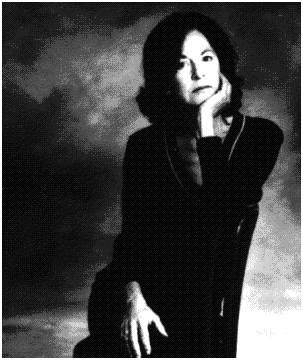Seven
Ages
Louise Glück
(ECCO/HarperCollins)
- It came to us very late:
perception of beauty, desire of knowledge.
And in the great minds, the two often configured as one.
To perceive, to speak, even on subjects inherently cruel ---
to speak boldly even when the facts were, in themselves, painful or dire ---
seemed to introduce among us some new action,
having to do with human obsession, human passion.
 Louise Glück writes poetry, poetry that appears regularly in all the right places: The New Yorker, The New York Review of Books, The Kenyon Review, The American Poetry Review. This is her eleventh book. She's won the Pulitzer Prize, the National Book Critics Circle Award, the New Yorker readers award. She teaches at Williams College.
Louise Glück writes poetry, poetry that appears regularly in all the right places: The New Yorker, The New York Review of Books, The Kenyon Review, The American Poetry Review. This is her eleventh book. She's won the Pulitzer Prize, the National Book Critics Circle Award, the New Yorker readers award. She teaches at Williams College.
It's facile enough, this versification --- and quite intellectual. But we suspect that a hundred years from now, Glück will not be the stuff of anthologies.
When we read,
And I think in the end this was the question
that destroyed Agamemnon, there on the beach...
we want to take our Marks-A-Lot and write, for the benefit of those who ain't up on their Homer, that famous Harold Ross question, the one he stuck in the margins of manuscripts sent in by professional obscurantists,
And when we read,
After one of those nights, a day:
the mind dutiful, waking, putting on its slippers...
We think, "Wait a minute, Louise. The mind putting on its slippers?" And we want to mark the page, right under the "C+," with a big
Or maybe even,
Our thought is that Ms. Glück is probably a gentle person, raised in a too too gentle world. None of this Tennyson calling up the troops, Ferlingetti doing it to Congressman Doyle, the Byronic stilettos, sticking it --- in verse, frozen, forever --- to poor old Bob Southey. Rather, Glück is composing what one of our friends called New Yorker/Kenyon Review panty-waist stuff. For instance, when Ms. Glück writes about Civilization,
It came to us very late:
perception of beauty, desire for knowledge.
And in the great minds, the two often configured as one,
we find ourselves humming along, a contented bee, feeling like we're in the middle of a course on the History of Civilization, there in Williamstown --- Civilization, without any of its discontents.
We've often contended that poetry worth writing home about has to be wrapped up in a whoosh of words --- maybe like Donne's wonderful strange lines,
I long to talk with some old lover's ghost
Who died before the god of love was born...
or
Busy old fool, unruly sonne
Why dost thou thus...
Perhaps (we're thinking), it's time for Ms. Glück to take a year off --- to do the sabbatical in Vail, or Virginia City, or Vancouver --- wherever the hell tired-out poets go to get back in touch with the world, or with themselves. Perhaps, out of the hubble- Perhaps in Venice, or Victoria, or Vienna, she could have a chance to renew acquaintance with some of the language masters: e e cummings, Edward Thomas, the Bard himself, say --- all those who are in it for sheer hypnotic music, music we don't find much of in Time was passing. Time was carrying us The onions! The potatoes! Perhaps it would help if some of us looney-cakes came along with her while she is out charging her batteries, help her get rid of what the blues singers call her "usta'-be" --- teach her how to be a bit more daft (contained lunacy always helps verse: see T. S. Eliot, John Ashbery, William Collins, Christopher Smart, Emily Dickinson). Or, how about pumping up some good old-fashioned ire and bitterness --- like Keats or Larkin or Plath: Keats with his profound loathing of aging, sickness, dying, The weariness, the fever, and the fret Or Larkin, I listen to money singing. It's like looking down Plath? Well, maybe Glück could pick up a bit of spare change from Plath...and her old black shoe. Louise Glück writes poetry, poetry that appears regularly in all the right places: The New Yorker, The New York Review of Books, The Kenyon Review, The American Poetry Review. This is her eleventh book. She's won the Pulitzer Prize, the National Book Critics Circle Award, the New Yorker readers award. She teaches at Williams College. Despite all that, at this point, the best thing we can find in The Seven Ages might be the name. No, not of the book --- the seven ages of, presumably, man. No, we're talking about Glück. As in Christoph Willibald. Makes us hope that, at the very least, someday she could stir up some inspiration from her great- Now there was someone who knew what to do with words, words and music.
faster and faster toward the door of the laboratory,
and then beyond the door into the abyss, the darkness.
My mother stirred the soup. The onions,
by a miracle, became part of the potatoes.
Here, where men sit and hear each other groan...
From long French windows at a provincial town,
The slums, the canal, the churches ornate and mad
In the evening sun. It is intensely sad.